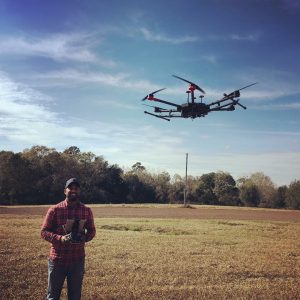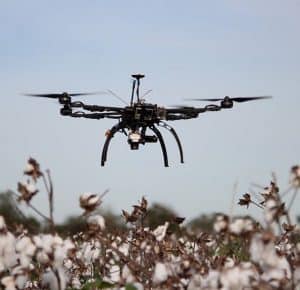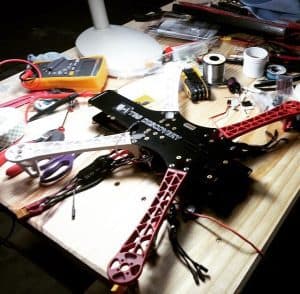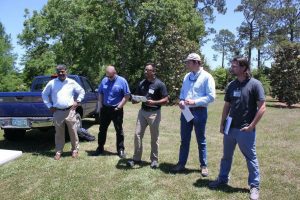Darren Raj earned his Bachelor of Science in Information Technology with a minor in Computer Science in 2009. The inspiration from a class he took while attending Florida State University mixed with his passion for remote control cars sparked an idea. This idea turned into a company he later founded: AgriBugs.
AgriBugs is a drone service provider for agriculture. Their drones use special imaging sensors in order to identify crop stress resulting from pest infestations, water stress, and other nutrient deficiencies. Darren has been able to help numerous commercial farmers and research staff, collecting data throughout Florida, South Georgia, and even California.
We did a Q&A with Darren where he explains how he started his own company, his visions for the future, and how his education prepared him for his career in IT. He even gives advice to students who are unsure about which career path to pursue.
Tell us about AgriBugs and how/why you started it.
I started Agribugs based on a class at Florida State University taught by Doug Tatum where learning how new technology, such as drones, can be applied to successful business models was the main concept of the class.
When I was young, remote control cars were a passion of mine. My brother, who started the hobby, passed his knowledge down to me, and when I learned that drones worked on the same basic concepts as remote control cars, it grabbed my attention.
Being in Tallahassee, we are centrally located at the center of agriculture to the west, east, and north of us. I visited the Institute of Food and Agricultural Sciences (IFAS) research station whose responsibility is to conduct research for agriculture to share for local farmers. I spoke to many research faculty, and saw the interest and potential market for this tech. After researching the fundamentals of Drones I started building my own from scratch and later purchased consumer grade drones and outfitted them with sensors for data collection.
What does a typical day look like for you working solely with AgriBugs now?
Before solely working for Agribugs, I had a full-time job, real estate projects, and Agribugs. Balancing my schedule was difficult, and there was no such thing as Saturdays and Sundays.
Now, my schedule consists of answering emails in the morning, a quick run, a healthy breakfast, and then out on the road to collect data for commercial farmers and research staff.
What is your vision for AgriBugs?
Agribugs is one of the first agriculture drone data collectors in Florida, so I was able to research and acquire grant funding early. This provided me with the ability to learn the market and how technology can help farmers. As a service provider, we are partnered with all North Florida IFAS research stations, and have worked with them from Gainesville to Immokalee. We are integrating into commercial crop consultant firms as their Drone Service Provider (DSP). DSP’s are a vast majority of the market and the technology is still piece milled together. We are currently developing technology for making data collection more reliable and easier for these data collectors.
Can you talk about some of your prior work experiences and how they’ve influenced your management of AgriBugs now?
One place I worked at before has a big impact on how the vision of AgriBugs is managed, Netcom Solutions. They provide network and IT solutions for small to medium businesses in South Florida. Servicing higher-end clients, such as medical practices and legal firms, allowed me to think outside the box and make quick decisions under pressure. At the time, Netcom Solutions operated on five individuals, including the owner, and netted more than seven figures at the end of the year. It was a very high stress job, but everyone did their part – whether it was server deployment, account management or sales. Being a service provider there are a couple fundamentals that are shared through the industry and it relies solely on understanding and serving your clients to the best of your ability.
How has your education prepared you for a career in IT?
Graduating from Florida State with an IT degree and minor in Computer Science, I understand how programs are made and applied to solve problems. This knowledge didn’t help me learn new technology, but rather to learn the processes on how technology moves through the development cycle and how they are integrated into work environments to provide a better solution for the customer. Understanding these basics helped me learn customer needs while creating a solution that they would pay for.
What advice would you give to someone who was unsure about what career path to pursue?
My advice to someone who is unsure of their career path is to first remove any financial expectations. This is my third and most successful startup, and I have learned that doing something that makes you happy should be your first criteria. What you do should be something that doesn’t seem like a job. It should be something that you wouldn’t mind waking up for in the morning. Furthermore, find out if what you want to do can help others and bring in a paycheck. If you call it a job you will not be happy, and that will show in your work.






